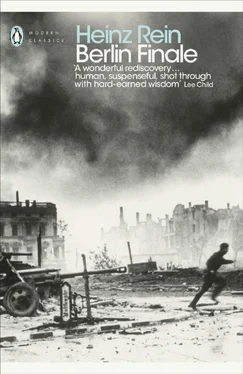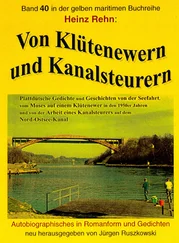Lassehn pushes aside the cap covering his eyes and raises his head, but he can’t see anything, he has to sit up to turn his head, and then he sees…
Klose is sitting by the radio, but he is not alone, there are two other men there, sitting right by the radio, with their heads leaning forward and their hands behind their ears as if they are listening. They have hard, angular faces, their muscles tense with resolution and defiance.
The voice that woke him is coming from the speaker, it is clear and unrhetorical, it makes no attempt to sound beautiful, it calls a spade a spade, it pours bitter, stinging mockery over the Nazi gods and turns them into bestial, belligerent, bloodthirsty philistines.
Never before has Lassehn heard such language. His heart starts thumping wildly, an iron circle settles around his forehead, he blinks uneasily and looks anxiously around. He would like to ask, but instead he listens as if under a spell. He holds his breath so as not to waste a single word. The voice over there comes from a completely different world, a world not held in the iron vice of violent rule. Lassehn wants to shout, there is something inside him that calls out to be shouted, joy, hope, liberation, hatred, torment, but all that issues from his throat is a hoarse croak.
Klose turns round and puts his finger to his mouth, while the two other men remain in their position without looking up.
‘Soldiers’ radio, western station, on short wave forty-one and thirty-two metres. Our news broadcast…’
A crackle in the speaker, Klose has turned off the radio. Lassehn swings his feet from the sofa and gets up, brushes his hair with his hand and straightens his jacket, then he stands uncertainly in the middle of the room.
‘Come here, Joachim,’ Klose calls and waves to him, ‘let me introduce my friends.’
Lassehn walks slowly over.
‘Don’t be shy, lad,’ Klose says encouragingly, and points at the two men in turn. ‘This is Dr Walter Böttcher and this is Friedrich Wiegand, former trade union secretary.’ Lassehn makes two stiff, clumsy bows and murmurs his name.
‘Sit down, son,’ Klose says, ‘and don’t be such a stranger, I’ve already told them both about you, you little deserter.’
‘Mr Klose,’ Lassehn says pleadingly and settles heavily on a chair, ‘please don’t use that term all the time.’
‘Why not?’ asks Dr Böttcher and looks carefully at Lassehn. ‘Being a deserter is no shame, Mr Lassehn, on the contrary. By deserting you have shown more courage than your comrades, who are presumably still stubbornly doing their duty. I am in fact of the opinion that your desertion is not an act of cowardice, because by deserting you have cast off your hated bonds and will no longer be abused, because you don’t want to make yourself guilty of the crimes that are being committed on foreign people and on the German people. The true cowards are the others who carry out all orders, however cruel and violent, and thus kill off their conscience. By old Prussian standards they are dutiful and courageous, but only because they are cowardly, because they lack the courage to put an end to it all and resist. That’s how you must see it, Mr Lassehn.’
‘Thank you, Doctor,’ Lassehn says quietly and looks Dr Böttcher in the face. ‘It is hard to find your bearings, there are no standards, no guidelines.’
‘Your generation, Mr Lassehn, is in a regrettable situation,’ Dr Böttcher says gravely. ‘We, particularly Wiegand and I, and our mutual friend Klose, have talked about it often and reached the conclusion that no young generation has been as unhappy as yours. The magnitude of your misfortune will only become apparent in its full horror after the collapse, which is only a matter of a few months away. Your generation will lose the ground beneath your feet because of the shattering of its foundation and plunge into the void. It will stand there empty-handed and with a disappointed heart, it will recognize the betrayal and the seduction to which it has fallen victim, but it will also recant all other ideals and every new faith it is offered. It will look at anyone who claims to offer leadership or who speaks of a vision of the world with deep suspicion and contempt and it will, consciously or otherwise, measure using the standards it has been brought up with.’
‘These young people, Doctor, of whom I too am one,’ Lassehn objects, ‘have known nothing else. The contempt for everything that existed before National Socialism has become its flesh and blood, and even if one day it should recognize the worthlessness of National Socialism and the criminality of its leaders, it does not mean that it places any trust in the spiritual and political leaders from the time before 1933.’
‘You are completely right,’ says Wiegand, joining in with the conversation. ‘At first it may be less a matter of immediately presenting this young generation with ready-made old ideas, or even new ones, and more one of making them forget what National Socialism has allowed to seep into it from many dubious sources, ceaselessly and with searing acids.’
‘It is clear, people,’ says Klose, ‘that what is drummed into you in your youth is fixed within you as if with a barbed hook. When I went to school, Old Kaiser Friedrich and Bismarck were still glorified, and to be quite honest I didn’t think critically about them until much later.’
‘It was the same for all of us, Klose,’ says Dr Böttcher, ‘but in the Kaiser’s Germany there was an opposition, there were certain freedoms, there were ways of getting hold of other information. But our young generation today has no opportunity to do that, it is excluded from everything that lies outside the circle of National Socialism, it encounters everything as if through a distorting mirror, the so-called National Socialist view of the world is filtered into it ready for use as an elixir, and all the things of this world, whether they be German history or stamp-collecting, biology or dance music, are interpreted for it in this sense.’
Lassehn sighs deeply, and helplessness and torment appear in his eyes. ‘What does it say in Faust ?’
‘Oh happy he who still can hope
To rise again from this great sea of error,
What we do not know is the very thing we needed
And what we know we cannot use.’
‘That’s exactly how it is. I envy you, Doctor, I envy you all, for your… How should I put it? Yes, in a way I envy your age.’
Dr Böttcher laughs bitterly. ‘Yes, that’s how it is. Probably for the first time in the world youth does not feel superior to age, it is not proud of being young. When you just said, Mr Lassehn, that you envied us our age you didn’t phrase it quite correctly. It is not our age that now appears so desirable to you, it is the knowledge and experiences that we accumulated at a time when National Socialism had not yet limited thought to a few primitive phrases. Admittedly this knowledge has not yet seeped into the consciousness of most of your generation, because it is still covered over with war and the frantically confident speeches of Hitler and Goebbels, but one day the war will be over and Hitler and Goebbels will no longer be there, once the great silence falls upon them and there is no one there to tell them everything they are doing is right, when their mistakes are held up to them on all sides, only then will they recognize that their youth has been shamefully betrayed, their capacity for enthusiasm scandalously abused, their thinking misled. Then the great vacuum will open up in front of it, because while the older generations can still flee into older visions of the world, into socialism, into communism, liberalism or democracy, the Church or some philosophical system, the youth will stand there spiritually naked. Do you have any idea of what will come after the inevitable defeat, Mr Lassehn?’
Читать дальше












